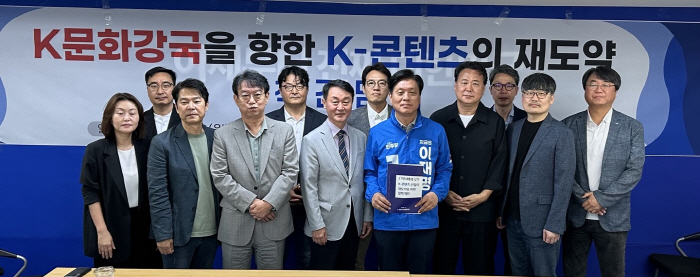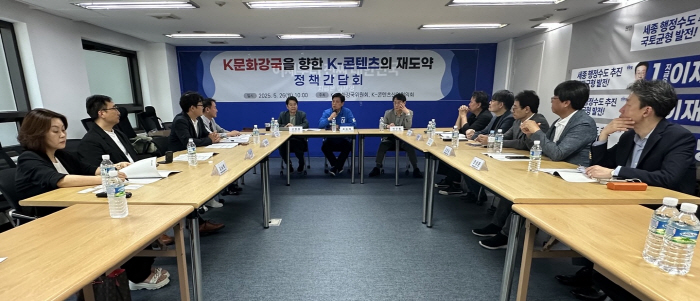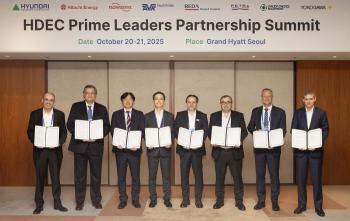Let's establish a new vice minister for K-content..K-Konsang Association Strengthens Global Competitiveness in Policy Talks with Democratic Party of Korea
May 26, 2025
|
The Korea Webtoon Industry Association (Chairman Seo Beom-gang) announced on the morning of the 26th that it held a policy meeting and a policy proposal delivery ceremony between the K-Content Industry Council and the K Cultural Power Committee of the Democratic Party of Korea in the conference room on the second floor of the Yongsan Building of the Democratic Party of Korea.
Representatives from the K-content industry, including the Korea Webtoon Industry Association (Chairman: Cho Young-ki), the Korea Game Industry Association (Chairman: Yoon Chul-ho), the Korean Publishers Association (Chairman: Lee Eun), the Korea Film Producers Association (CEO: Lee Dong-ha), the Korea Drama Producers Association (Chairman: Song Byung-joon), the Korea Music Contents Association (Chairman: Kim Chang-hwan), the Korea Label Industry Association (Chairman: Lee Kyu-young), the Korea Animation Industry Association (Chairman: Park Chang-shin), and the Korea Mobile Game Association (Chairman: Hwang Sung-ik). In the Democratic Party of Korea, Yoo Hong-joon, chairman of the K Cultural Power Committee, Lee Woo-jong, co-chairman of the K Cultural Power Committee, and lawmaker Cho Seung-rae were also present.
The K-Content Industry Council (hereinafter referred to as the Council) is an organization launched to seek policy changes necessary for the re-leap of the content industry, which has recently suffered a crisis of stagnation in growth, and is composed of 10 associations and organizations representing the domestic content industry.
Through the signing ceremony, the council delivered a policy proposal containing the common tasks of the domestic content industry and tasks by sector to the Democratic Party of Korea's election committee.
The proposal presented six major tasks for the K-content re-leap: ▶ Establishment of K-content integrated governance ▶ Significant expansion of K-content support budget and business ▶ Resolution of tax discrimination in the content sector ▶ Expansion of investment and financial systems to strengthen global competitiveness ▶ Support for special exports and overseas expansion to overcome stagnation and crisis ▶ Improvement of customized laws and systems to meet the characteristics of content and crisis situations.
|
In the budget and business sector, it proposed the establishment of the Korea Culture and Technology Research Institute and an increase in the size of cultural technology R&D with the aim of creating the world's best content production foundation. It also added the expansion of the cultural voucher project, the expansion of multi-year government support projects, and the establishment of the Game Industry Promotion Fund.
In the tax sector, the government proposed improving/complementing R&D tax credits in the content sector, expanding the scope of tax credit support for video content production costs, resolving double taxation issues on overseas sales, and expanding cultural cost income deductions for all genres of K-content.
In the case of the investment and financial system, it was proposed to expand specialized accounts by sector within the fund, establish new content startup accounts, and raise government investment ratios by upgrading the operation of the parent fund in the content sector, and establish a specialized content investment bank.
Regarding export and overseas expansion support, it proposed the establishment of content export strategy governance to strategically break through opportunities and crises in the midst of the global trade war, such as the agenda of different issues in the Chinese market for K-content and the imposition of U.S. tariffs when holding top-level talks between Korea and China.
In the legal and institutional sectors, a new version of the Cultural Industry Fair Distribution Act was enacted in accordance with the advancement of content services, and fees between overseas content platforms and domestic content producers and distributors were required in accordance with the trend of online content distribution.
In particular, it was suggested that it is necessary to legally guarantee and strengthen the role of the content industry, which is a base industry, in relation to AI legislation, and to legislate the copyright holder's obligation to report appropriate compensation and usage status for commercial use. In addition, he requested that creative and flexible working environments be reviewed in accordance with the characteristics of the content industry.
The consultative body said "This agreement is expected to serve as an opportunity to seek policy solidarity to strengthen global competitiveness in each field of the K-content industry through organic cooperation between industry and politics."
This article was translated by Naver AI translator.















